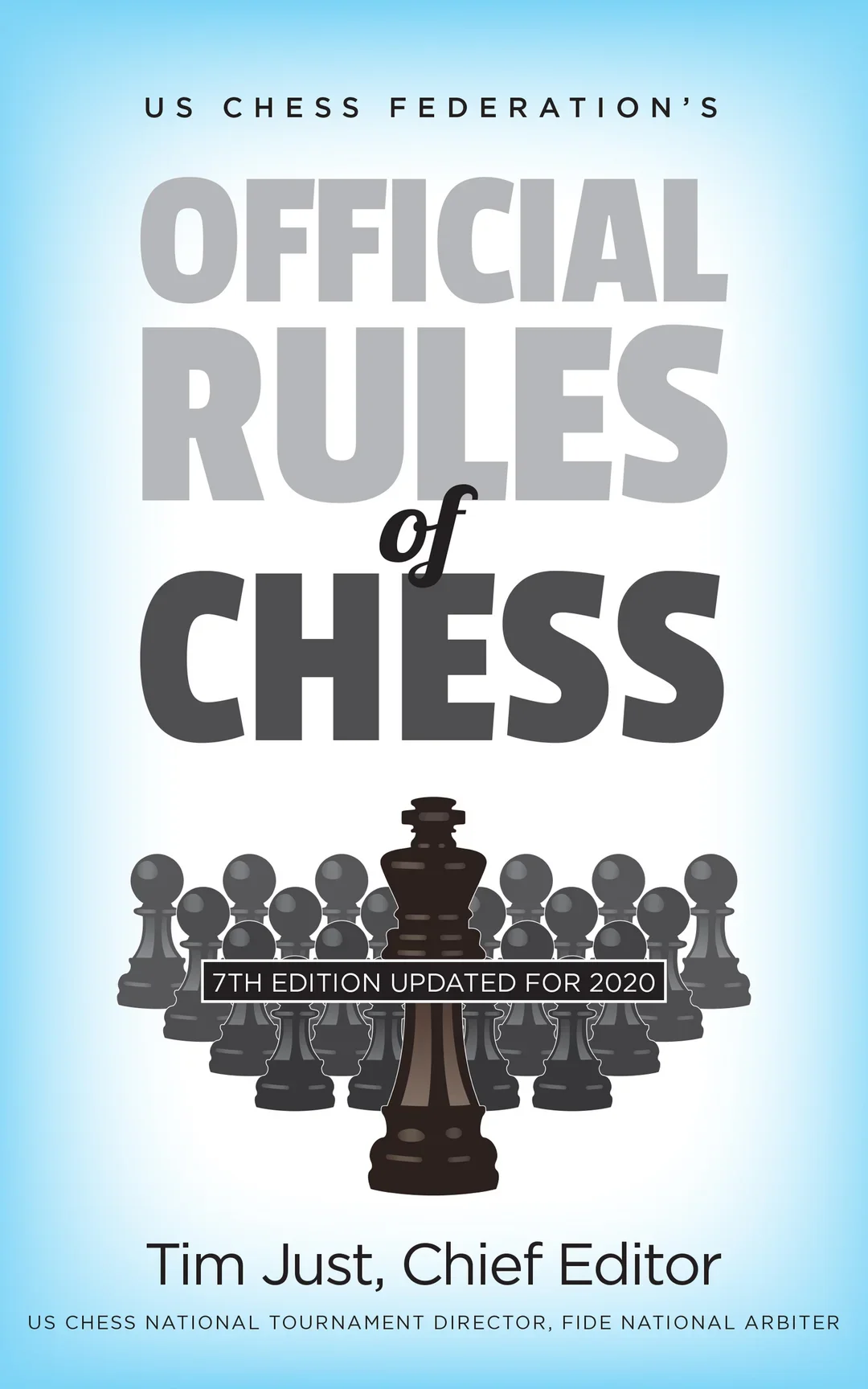Tim Just elaborates on rule changes effective with the 7th edition of the Rule Book, which can be found here.
Why? One rule change will blockade the avenue traveled by the Rules Benders Association. The other adjustment sees to it that the intent and meaning of a rule’s words match. Change is inevitable.
Why: Wait and See Rules Flaw?
Your opponent calls the TD over to your contest. He claims you made an illegal move—seven moves ago. While the TD confirms your opponent’s claim you realize that you did accidently make an illegal move, while not in time pressure. You did not intend to make an illegal move, but things happen. The TD uses his “WayBack Machine” to set up the position to right before the illegality took place. He requires that you make a legal move. And as a penalty, your counterpart gets two minutes added to his playing time. So, your opponent waits to see that your illegal move resulted in a position favorable to you, and not him—plus he gets a two-minute payment for pointing that out? TJ: To eliminate this kind of unfair flaw in the rules, as of 1-1-20 rule 11D will add some wording to eliminate this delayed claim reward. The rule is not taking away the right of a player to still claim an illegal move, just their ability to receive those extra two minutes if they wait too long to speak up. To still qualify for that extra two-minute reward, the player making the illegal move claim will need to do so before making their own next move.Why: Meaning Vs Intent.
You and your opponent are in time pressure. The game clock shows less than five minutes for each of you; i.e., time pressure. And then it happens—your counterpart makes an illegal move. You instantly call him on it. The clocks are stopped. The TD rolls back the position to match the one right before the illegal move. Your opponent must try again to make a legitimate move. The clock is started. Hold on, what happened to your two-minute reward? Both your opponent and the TD point to wording in the rulebook indicating that after the position is reinstated properly there shall be: “…no adjustment to the time on the clocks.” Penalties, they both claim, are adjustments to time on the clocks; therefore, you do not get two-minutes added to your time—say what?! That is not the intent of those words. TJ: When old Rule 11D1 was massaged, before the publication of the 7th edition, the rules givers tried to make sure that TDs did not reinstate the clock times that existed before the illegal move was made; thus, the wording: “…no adjustment to the time on the clocks.” Those words to some were interpreted to literally mean that no time adjustments of any kind were to be made to the game clock, no matter what—even adjustments for penalties. As of 1-1-20 those often-misunderstood words will be eliminated from 11D1. Penalties can be dished out, but clocks cannot be reset to show the previous time before the illegal move in time pressure. Below are the revised rules 11D and 11D1. Eliminated language is indicated by the strike out font. Any new wording is indicated in red.11D. Illegal move.
If a player completes an illegal move by pressing the clock, in addition to the usual obligation to make a legal move with the touched piece if possible, the standard penalty specified in rule 1C2a applies (i.e. two minutes added to the opponent’s clock). If the opponent has completed a move subsequent to the illegal move, the standard penalty shall not apply. See also 11J, Deliberate illegal moves and 16D1, Illegal moves. TD TIP: A player should make sure to claim an illegal move made by his opponent before completing his next move, in order to be eligible to receive the additional time.11D1. Illegal move in time pressure.
Time pressure is defined as a situation where either player has less than five minutes left in a time control and the time control does not include an increment or delay of 30 seconds or more. A director should not call attention to illegal moves in time pressure, only the players may make that claim. If, during the game, in time pressure, a player’s claim that one of either player’s last two moves was illegal is upheld by the TD, the position shall be reinstated to what it was before the illegal move and the procedure in rule 11A shall be followed with no adjustment to the time on the clocks. See also 16D1, Illegal moves; 11H, Director corrects illegal move in non-sudden death; and 11J, Deliberate illegal moves. BONUS QUESTION: Why was rule 16D1 eliminated as a “See also” reference from both 11D and 11D1? Answer: Rule 16D1 was eliminated some time ago—it no longer exists. The free US Chess Rules (Chapters 1+2+11 from the 7th edition rulebook) are now downloadable and available on-line. Past “Just the Rules” columns can be viewed here. Tim Just is a National Tournament Director, FIDE National Arbiter, and editor of the 5th, 6th, and 7th editions of the US Chess Rulebook. He is also the author of My Opponent is Eating a Doughnut & Just Law, which are both available from US Chess Sales and Amazon/Kindle. Additionally, Tim recently revised The Guide To Scholastic Chess, a guide created to help teachers and scholastic organizers who wish to begin, improve, or strengthen their school chess program. Tim is also a member of the US Chess Rules Committee. His new column, exclusive to US Chess, “Just the Rules” will help clarify potentially confusing regulations.Categories
Archives
- July 2025 (6)
- June 2025 (25)
- May 2025 (24)
- April 2025 (29)
- March 2025 (29)
- February 2025 (20)
- January 2025 (24)
- December 2024 (34)
- November 2024 (18)
- October 2024 (35)
- September 2024 (23)
- August 2024 (27)
- July 2024 (44)
- June 2024 (27)
- May 2024 (31)
- April 2024 (51)
- March 2024 (34)
- February 2024 (25)
- January 2024 (26)
- December 2023 (29)
- November 2023 (26)
- October 2023 (37)
- September 2023 (27)
- August 2023 (37)
- July 2023 (47)
- June 2023 (33)
- May 2023 (37)
- April 2023 (45)
- March 2023 (37)
- February 2023 (28)
- January 2023 (31)
- December 2022 (23)
- November 2022 (32)
- October 2022 (31)
- September 2022 (19)
- August 2022 (39)
- July 2022 (32)
- June 2022 (35)
- May 2022 (21)
- April 2022 (31)
- March 2022 (33)
- February 2022 (21)
- January 2022 (27)
- December 2021 (36)
- November 2021 (34)
- October 2021 (25)
- September 2021 (25)
- August 2021 (41)
- July 2021 (36)
- June 2021 (29)
- May 2021 (29)
- April 2021 (31)
- March 2021 (33)
- February 2021 (28)
- January 2021 (29)
- December 2020 (38)
- November 2020 (40)
- October 2020 (41)
- September 2020 (35)
- August 2020 (38)
- July 2020 (36)
- June 2020 (46)
- May 2020 (42)
- April 2020 (37)
- March 2020 (60)
- February 2020 (38)
- January 2020 (45)
- December 2019 (35)
- November 2019 (35)
- October 2019 (42)
- September 2019 (45)
- August 2019 (56)
- July 2019 (44)
- June 2019 (35)
- May 2019 (40)
- April 2019 (48)
- March 2019 (61)
- February 2019 (39)
- January 2019 (30)
- December 2018 (29)
- November 2018 (51)
- October 2018 (45)
- September 2018 (29)
- August 2018 (49)
- July 2018 (35)
- June 2018 (31)
- May 2018 (39)
- April 2018 (31)
- March 2018 (26)
- February 2018 (33)
- January 2018 (30)
- December 2017 (26)
- November 2017 (24)
- October 2017 (30)
- September 2017 (30)
- August 2017 (32)
- July 2017 (27)
- June 2017 (32)
- May 2017 (26)
- April 2017 (37)
- March 2017 (28)
- February 2017 (30)
- January 2017 (27)
- December 2016 (29)
- November 2016 (24)
- October 2016 (32)
- September 2016 (31)
- August 2016 (27)
- July 2016 (24)
- June 2016 (26)
- May 2016 (19)
- April 2016 (30)
- March 2016 (37)
- February 2016 (27)
- January 2016 (33)
- December 2015 (25)
- November 2015 (23)
- October 2015 (16)
- September 2015 (28)
- August 2015 (28)
- July 2015 (6)
- June 2015 (1)
- May 2015 (2)
- April 2015 (1)
- February 2015 (3)
- January 2015 (1)
- December 2014 (1)
- July 2010 (1)
- October 1991 (1)
- August 1989 (1)
- January 1988 (1)
- December 1983 (1)









